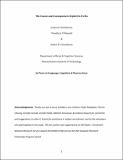The causes and consequences explicit in verbs
Author(s)
Tenenbaum, Joshua B.; Hartshorne, Joshua; O'Donnell, Timothy John
DownloadHartshorne_Cons_Rerevised.pdf (1.274Mb)
OPEN_ACCESS_POLICY
Open Access Policy
Creative Commons Attribution-Noncommercial-Share Alike
Terms of use
Metadata
Show full item recordAbstract
Interpretation of a pronoun in one clause can be systematically affected by the verb in the previous clause. Compare Archibald angered Bartholomew because he … (he = Archibald) with Archibald criticised Bartholomew because he … (he = Bartholomew). While it is clear that meaning plays a critical role, it is unclear whether that meaning is directly encoded in the verb or, alternatively, inferred from world knowledge. We report evidence favouring the former account. We elicited pronoun biases for 502 verbs from seven Levin verb classes in two discourse contexts (implicit causality and implicit consequentiality), showing that in both contexts, verb class reliably predicts pronoun bias. These results confirm and extend recent findings about implicit causality and represent the first such study for implicit consequentiality. We discuss these findings in the context of recent work in semantics, and also develop a new, probabilistic generative account of pronoun interpretation.
Date issued
2015-02Department
Massachusetts Institute of Technology. Department of Brain and Cognitive SciencesJournal
Language, Cognition and Neuroscience
Publisher
Routledge
Citation
Hartshorne, Joshua K., Timothy J. O’Donnell, and Joshua B. Tenenbaum. “The Causes and Consequences Explicit in Verbs.” Language, Cognition and Neuroscience (February 9, 2015): 1–19.
Version: Author's final manuscript
ISSN
2327-3798
2327-3801